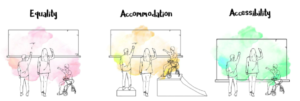Education that’s really for everyone

Written by Karen Roberts, Disability Support Coordinator
Disability Support provide services to students with a wide variety of disabilities and ongoing medical conditions.
The good news – there are increasing numbers of students with disabilities enrolling in tertiary education, with participation rates in South Australia for students with disabilities the highest nationally, and exceeding the national target
The challenge – students registering with Disability Support are presenting with increasingly complex needs, and some of our current support options are time consuming and costly, and resource intensive for academics
Disability Support provides services to students under the following legislation and university policies:
- Commonwealth Disability Discrimination Act 1992
- Disability Standards for Education 2005
- UoA Reasonable Adjustments to Learning, Teaching and Assessment for Students with a Disability Policy- updated 2019
- UofA Disability Action Plan 2013- 2019
The main aim of the Disability Standards for Education (2005) is to give students with a disability the right to participate in educational programs on the same basis as students without a disability.
This means that students with a disability often need to be provided with individualised Reasonable Adjustments, in order to participate or complete tasks on the same basis as other students.
“Interaction Institute for Social Change | Artist: Angus Maguire.” interactioninstitute.org and madewithangus.com
Our Disability Advisors can assist academics in determining Reasonable Adjustments, and where needed, organise relevant supports (e.g. equipment, assistive technology, e-books, external services such as captioning or transcriptions).
Organising external services and equipment can be time consuming and costly, and a student’s study may be impacted whilst they are waiting for these to be provided.
A better way – A more inclusive approach is to develop course content and assessments with Universal Design for Learning guidelines in mind. This enables all students to participate in learning and teaching activities, without the need for individual Reasonable Adjustments.
Source: https://flexforward.pressbooks.com/chapter/accessible-education/
‘Universal design is the design of products and environments to be usable by all people, to the greatest extent possible, without the need for adaptation or specialized design.’ The Centre for Universal Design
In education, this means developing course content, teaching materials and delivery methods to be accessible to and usable by students across the broadest diversity ranges. ADCET-universal design
Creating content that would be suitable for students with a range of disabilities (e.g. vision impairment, hearing impairment, or difficulties with reading or writing), will also benefit other students, such as international students.
The Learning Designers in LEI can assist you in using Universal Design principles.
How to make a difference:
From a practical perspective, here are some simple ideas from Disability Support that can make a significant difference:
- Ensure Word or PDF documents are formatted correctly, and PDF documents are not locked by the developer (which prevents use of assistive technology) How to structure documents correctly
- Uploaded documents (e.g. power point slides) should be available in ‘one slide to a page’ to enable use of assistive technology
- Where possible provide e-resources and links to e-books/texts. Avoid using poor quality photocopied material as resources. The library staff can help with this coursereadings@adelaide.edu.au
- Ensure all videos are captioned, and transcriptions provided. When creating a video, use a script which makes the captioning/transcription process quicker and easier at the development stage. Avoid using auto-captioning through YouTube, as accuracy is often poor
- Provide options for assessment, or different modes of assessment to enable students to demonstrate their knowledge without being limited by their disability (e.g. oral presentation may be more manageable than a written essay for a student with dyslexia; assignment may be more manageable than an exam for a student with memory difficulties)
And remember…. We are here to help. Contact us at disability@adelaide.edu.au tel: 8313 5962
To find out more visit Student Life or email Disability Support.


